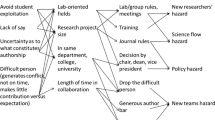Abstract
Collaborative scientific projects can be considered public goods dilemmas. This is a particular type of social dilemma, where short-term immediate self-interests are at odds with long-term collective benefits. Perhaps the best known solution to the free-rider problem in social dilemmas is communication between participants prior to making contributions to the public good. However, there is research to suggest that people contribute less to public goods while communicating on-line before the dilemma, as opposed to face-to-face discussion. This chapter will discuss why computer-mediated mediums of communication are less effective at improving cooperation amongst collaborators (e.g., lack of social cues to examine the credibility of commitment, less leadership, and poorer monitoring of other’s behavior) and propose several means for addressing this challenge to on-line collaborations (e.g., videoconference, telephone communication, prior face-to-face interactions, frequent coordinated communications, and reputation evaluations).
Access this chapter
Tax calculation will be finalised at checkout
Purchases are for personal use only
Similar content being viewed by others
References
Balliet, D. (2010). Communication and cooperation in social dilemmas: A meta-analytic review. Journal of Conflict Resolution, 54, 39–57.
Bicchieri, C. (2002). Covenants without swords: Group identity, norms, and communication in social dilemmas. Rationality and Society, 14, 192–228.
Bicchieri, C., & Lev-On, A. (2007). Computer-mediated communication and cooperation in social dilemmas: An experimental analysis. Politics, Philosophy, and Economics, 6, 139–168.
Biel, A., & Thogersen, J. (2007). Activation of social norms in social dilemmas: A review of the evidence and reflections on the implications for environmental behavior. Journal of Economic Psychology, 28, 93–112.
Boone, C., Declerck, C. H., & Suetens, S. (2008). Subtle social cues, explicit incentives, and cooperation in social dilemmas. Evolution and Human Behavior, 29, 179–188.
Bos, N., Gergle, D., Olson, J. S., & Olson, G. M. (2009). Being there versus seeing there: trust via video. Ann Arbor, MI: University of Michigan. Unpublished Manuscript.
Brosig, J., Ockenfels, A., & Weimann, J. (2001). The effect of communication media on cooperation. German Economic Review, 4, 217–241.
Dawes, R. M., McTavish, J., & Shaklee, H. (1977). Behavior, communication, and assumptions about other people’s behavior in a commons dilemma situation. Journal of Personality and Social Psychology, 35, 1–11.
De Cremer, D., & Bakker, M. (2003). Accountability and cooperation in social dilemmas: The influence of others’ reputational concerns. Current Psychology, 22, 155–163.
Deutsch, M. (1958). Trust and suspicion. The Journal of Conflict Resolution, 2, 256–279.
Finkel, E. J., Campbell, W. K., Brunell, A. B., Dalton, A. N., Scarbeck, S. J., & Chartrand, T. L. (2006). High maintenance interaction: Inefficient social coordination impairs self-regulation. Journal of Personality and Social Psychology, 91, 456–476.
Frohlich, N., & Oppenheimer, J. (1998). Some consequences of e-mail vs face-to-face communication in experiment. Journal of Economic Behavior and Organization, 35, 389–403.
Jensen, C., Farnham, S. D., Drucker, S. M., & Kollock, P. (2008). The effect of communication modality on cooperation in online environments. Atlanta, Georgia: College of Computing Georgia Institute of Technology. Unpublished Manuscript.
Kerr, N. L., Garst, J., Lewandowski, D. A., & Harris, S. E. (1997). That still, small voice: Commitment to cooperate as an internalized versus a social norm. Personality and Social Psychology Bulletin, 23, 1300–1311.
Ketelaar, T., & Au, W. T. (2003). The effects of feelings of guilt on the behavior of uncooperative individuals in repeated social bargaining games: An affect-as-information interpretation of the role of emotion in social interaction. Cognition and Emotion, 17, 429–453.
Kollock, P. (1998). Social dilemmas: The anatomy of cooperation. Annual Review of Sociology, 24, 183–214.
Kurzban, R. (2001). The social psychophysics of cooperation: Nonverbal communication in a public goods game. Journal of Nonverbal Behavior, 25, 241–259.
Miettinen, T., & Suetens, S. (2008). Communication and guilt in a prisoners dilemma. Journal of Conflict Resolution, 52, 945–965.
Milinski, M., Semmann, D., & Krambeck, H.-J. (2002). Reputation helps solve the tragedy of the commons. Nature, 415, 424–426.
Orbell, J. M., van de Kragt, A. J. C., & Dawes, R. M. (1988). Explaining discussion-induced cooperation. Journal of Personality and Social Psychology, 54, 811–819.
Ostrom, E., Walker, J., & Gardner, R. (1992). Covenants with and without a sword: Self-governance is possible. American Political Science Review, 86, 404–417.
Richman, L., & Leary, M. R. (2009). Reaction to discrimination, stigmatization, ostracism, and other forms of interpersonal rejection: A multi-motive model. Psychological Review, 116, 365–383.
Rocco, E. (1998). Trust breaks down in electronic contexts but can be repaired by some initial face-to-face contact. Ann Arbor, MI: University of Michigan. Unpublished Manuscript.
Rocco, E., & Warglien, M. (1996). Computer mediated communication and the emergence of “electronic opportunism”. Trento, Italy: University of Trento. Unpublished Manuscript.
Tazelaar, M. J. A., Van Lange, P. A. M., & Ouwerkerk, J. W. (2004). How to cope with “noise” in social dilemmas: The benefits of communication. Journal of Personality and Social Psychology, 87, 845–859.
Twenge, J. M., Baumeister, R. F., DeWall, C. N., Ciarocco, N. J., & Bartels, J. M. (2007). Social exclusion decreases prosocial behavior. Journal of Personality and Social Psychology, 92, 56–66.
Wichman, H. (1970). Effects of isolation and communication on cooperation in a two-person game. Journal of Personality and Social Psychology, 16, 114–120.
Zheng, J., Bos, N., Olson, J. S., & Olson, G. M. (2008). Trust without touch: Jump-start trust with social chat. Ann Arbor, Michigan: University of Michigan. Unpublished Manuscript.
Zheng, J., Veinott, E., Bos, N., Olson, J. S., & Olson, G. M. (2009). Trust without touch: Jumpstarting long-distance trust with initial social activities. Ann Arbor, Michigan: University of Michigan. Unpublished Manuscript.
Author information
Authors and Affiliations
Corresponding author
Editor information
Editors and Affiliations
Rights and permissions
Copyright information
© 2010 Springer-Verlag Berlin Heidelberg
About this chapter
Cite this chapter
Balliet, D. (2010). E-Research Collaboration and the Free-Rider Problem: Communication Solutions to Social Dilemmas in Computer Mediated Research Collaborations. In: Anandarajan, M., Anandarajan, M. (eds) e-Research Collaboration. Springer, Berlin, Heidelberg. https://doi.org/10.1007/978-3-642-12257-6_17
Download citation
DOI: https://doi.org/10.1007/978-3-642-12257-6_17
Published:
Publisher Name: Springer, Berlin, Heidelberg
Print ISBN: 978-3-642-12256-9
Online ISBN: 978-3-642-12257-6
eBook Packages: Business and EconomicsBusiness and Management (R0)




